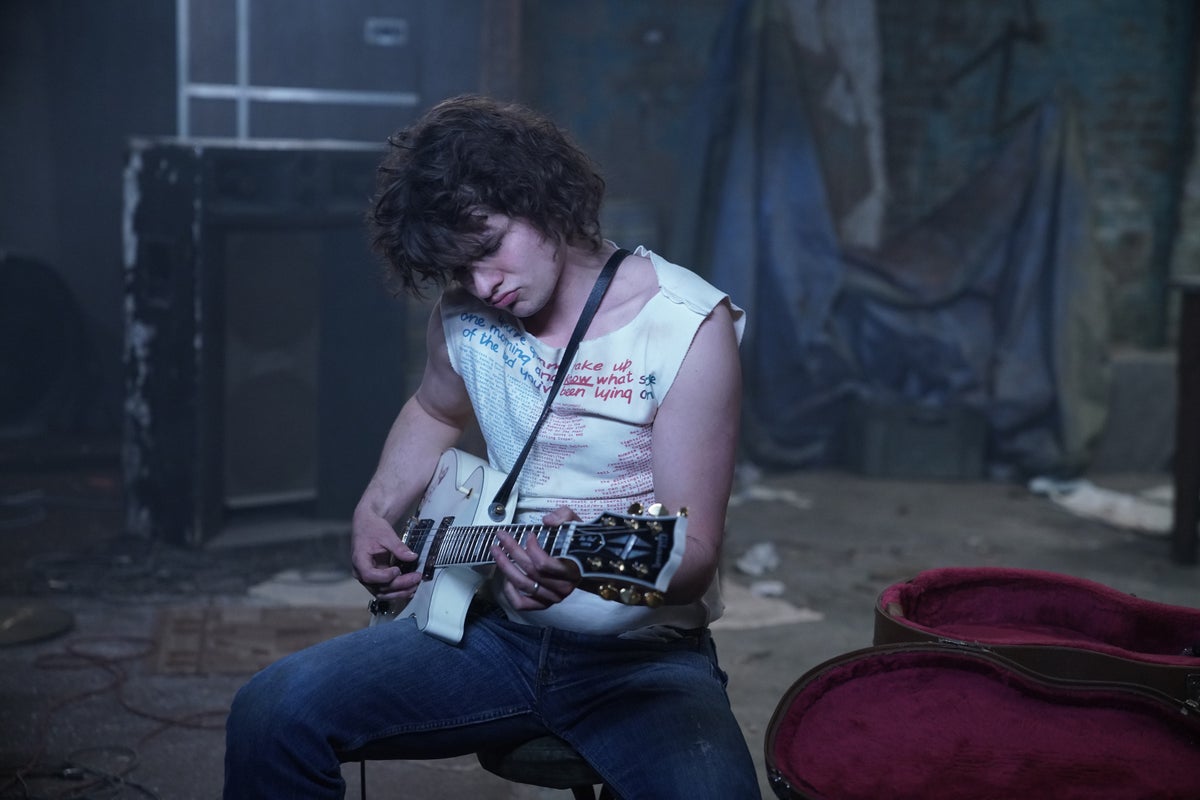
It didn’t matter how the Sex Pistols sounded. It only mattered how they looked.
Pistol, a six-part Disney Plus series about the wild rise and incendiary fall of Britain’s most notorious and fractious punk rock band, is littered with versions of the same deceptively braggadocious claim. “We’re not into music,” guitarist Steve Jones, whose 2016 memoir Lonely Boy lends the miniseries its shape, says after one of the band’s early gigs. “We’re into chaos.”
That sentiment is echoed so often by so many – by Sid Vicious, by Johnny Rotten, by the band’s Machiavellian pipsqueak of a manager, Malcolm McLaren – that it eventually emerges as the band’s slipshod manifesto. For better and worse, it might also have been the guiding principle for Danny Boyle’s ambitious and occasionally even exuberant take on a story that’s been told for the screen a few times before already, most notably in the dark cult hit Sid & Nancy.
In this version, working-class teen Steve, played with a stormy mix of vim and despondency by Toby Wallace (Babyteeth), wills the Sex Pistols into existence in London in the 1970s. He’s not just the bandmate who needs it the most – his stepfather despises him, he’s functionally illiterate – but the one with the audacity to steal the equipment they need from the Odeon.
Still, it’s easy to imagine the group never graduating from garage rehearsals if it weren’t for fashion designer Vivienne Westwood (Talulah Riley), who takes a shine to Steve even as he attempts to rob her shop. Vivienne’s opportunist boyfriend, Malcolm, glimpses a scrubby appeal in Steve to match the despair of austerity Britain. “Ruffians like you excite me,” declares Malcolm, played with slick charm undercut by a kind of sleazy, languorous elocution by Thomas Brodie-Sangster (The Queen’s Gambit).
It’s never clear how seriously Malcolm takes his anti-establishment, anti-fascist politics; what’s more certain is that he sees an opportunity to commoditise the moment. He brings in Johnny Rotten (Anson Boon), who has never sung before, as the band’s frontman, and later Sid Vicious (Louis Partridge, Enola Holmes), who has never played the bass before, to replace the bassist – the only guy in the band who can meaningfully play his instrument.
Boyle never lands the plane on the question of the Sex Pistol’s authenticity, which had its roots in the bandmembers’ working-class backgrounds, but found its expression in a brutal sound and anarchist image superintended by Malcolm. In all likelihood, the truth is in the slightly unsatisfying grey space Boyle evokes. The Pistols were making the culture at the same time they were responding to it. Malcolm was drawn to them because they had nothing left to live for – a condition that changed the instant he agreed to back them.
The more glaring problem is that the series never achieves the rollicking kineticism we associate with the Sex Pistols or punk rock or even the pacy flamboyance we’ve come to expect from other Danny Boyle productions, such as Trainspotting or Slumdog Millionaire. The performance scenes come closest. Boon captures the frontman’s menacing intensity, and though Partridge can’t match Gary Oldman’s ferocity in Sid & Nancy, his Sid is more youthful, more vulnerable.
The Sex Pistols have been lauded as groundbreakers and condemned as hellions – the BBC famously wouldn’t air their single “God Save the Queen” even after it topped the charts – but here they’re also plainly kids. Sydney Chandler (Don’t Worry Darling) is especially affecting as a pre-Pretenders Chrissie Hynde who refuses to go home to Ohio until she’s a star. For most of the series, the Sex Pistols feel more like runaways than rockstars.
The action is intercut with grainy archival footage (a waving queen, scenes of striking workers and others of police violence) that efficiently establishes the series’ milieu. But the show’s portrayal of punk rock itself – filtered through the lens of Malcolm’s machinations and even, at times, the vanity of the kids in the band – feels more like an image than a spirit, an escape rather than a way of life. Pistol, unlike the music that inspired it, never grabs you by the throat.







